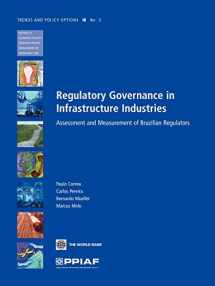
Regulatory Governance in Infrastructure Industries: Assessment and Measurement of Brazilian Regulators (PPIAF Trends and Policy Options)
Book details
Summary
Description
This paper assesses and measures regulatory governance in 21 infrastructure regulators in Brazil. Regulatory Governance is decomposed into four main attributes: autonomy; decision-rules; means and tools; and accountability. A ranking is proposed and the main areas for improvement identified. A comparison of the proposed regulatory governance index and other indexes internationally available is performed.
Section 2 sets up the analytical framework for the report, identifying key components of regulatory governance, namely, autonomy (political and financial), procedures for decision-making, tools and means (including personnel), and accountability.
Section 3 assesses each of these components in practice, reporting the results of a survey with 21 regulatory agencies in Brazil, which was designed and implemented in 2005.
Section 4 measures regulatory governance based on three related indexes, ranks the Brazilian regulators among themselves, and compares the proposed indexes with other two indicators available in the literature.
Section 5 presents the conclusions.


We would LOVE it if you could help us and other readers by reviewing the book
Book review



